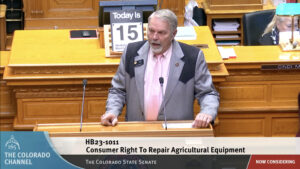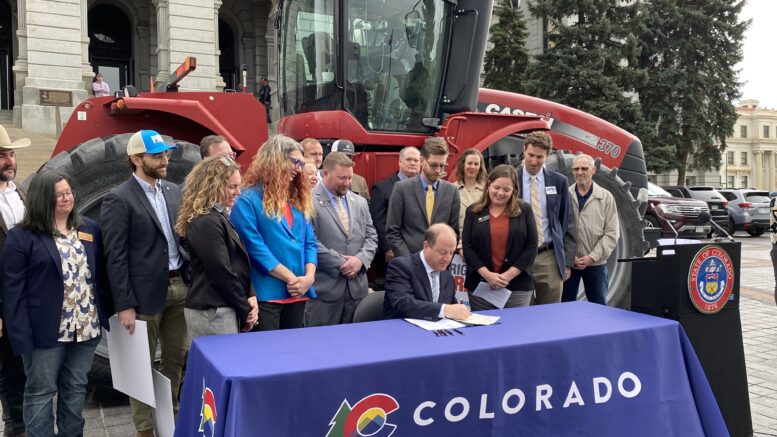Colorado will become the first state in the U.S. to give owners of tractors and other agricultural equipment the ability to fix the products they own, following a bill-signing by Gov. Jared Polis Tuesday that expands the state’s already boundary-pushing right-to-repair law.
House Bill 1011, which will go into effect on Jan. 1, requires agricultural-equipment manufacturers to provide parts, software and documents that farmers or independent tractor servicers need to fix their equipment at a reasonable price. It follows two laws the Democratic governor signed last year that offers similar rights to owners of powered wheelchairs.
In a micro-sense, HB 1011, sponsored by Democratic Rep. Brianna Titone of Arvada and Republican Rep. Ron Weinberg of Loveland, will impact farmers who’ve complained of waiting for days or weeks to get manufacturers’ representatives out to diagnose and fix equipment. Where many farmers used to be able to tinker with tractors and combines on their own, more repairs to engines require the use of codes that leave farmers dependent on dealers and repair shops to perform service, which can be needed quickly during planting and harvesting seasons.
A wider right to repair
But in a bigger sense, the signing of this new law could open the door to Colorado legislators requiring more sectors to allow consumers a right to repair the more complex products they buy — a suggestion that several witnesses said during a March committee hearing is necessary.
“I’ve heard countless stories of farmers being forced to spend outrageous amounts on equipment repairs, waiting weeks for a repair technician or opting for dated technology because they can repair it easier,” Titone said in a news release. “Right to repair empowers Coloradans to fix their own equipment, and I hope that this legislation can be a blueprint for other states across the nation.”
Both the immediate and farther-flung impacts of the bill worried detractors, however.

Colorado state Sen. Rod Pelton speaks against an agricultural right-to-repair bill in the Senate.
Tractor manufacturers and some farmers noted that several major equipment makers recently had signed memoranda of understanding to provide buyers and repair shops the right to repair their offerings, and they said that free-market approach is preferable to a government mandate. Other opponents, which included the majority of Republicans in the Legislature, also said the bill sets a bad precedent with its interference with private contracts.
“We don’t need this bill to get in between private businesses and their consumers,” said Rep. Rod Pelton, a Cheyenne Wells Republican and a farmer.
Changes during the process
Proponents made several fixes to the bill to try to get it to a place of consensus. Titone, for example, removed language in the bill that would have required repair parts be provided at the manufacturer’s suggested retail price and replaced it with the more vaguely worded “reasonable price” to ensure the bill did not engage in price-fixing.
Polis, who owned and sold several start-up businesses before getting into politics, is a supporter of disruptive business practices, and the signing of HB 1011 seems to further that aim.
Backers such as Danny Katz, executive director of the Colorado Public Interest Research Group, implied during last month’s hearing that this will not be the last effort to give consumers the ability to fix things that they have purchased.
But most of the reaction after Tuesday’s signing ceremony, which took place on the west steps of the Capitol in front of a high-horsepower tractor, focused on how the new law will change the 2024 planting season for Coloradans.
“A broken tractor or combine during harvest season can be devastating and makes an already difficult job that much harder,” co-sponsoring Sen. Janice Marchman, D-Loveland, said in a news release. “Farmers should be able to apply know-how and elbow grease to fix their own equipment instead of being forced to use an authorized dealer.”
